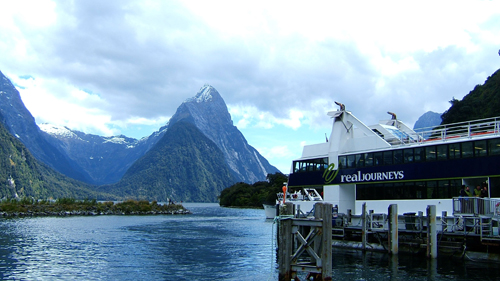세계 속의 한국: 뉴질랜드

To make Hyo Jeong Lee’s face light up, just mention New Zealand. She moved there in 2005 to attend the University of Wellington.
“Fresh air. Clean streets. A beautiful campus. So many activities, and good tastes and smells from the cafes!” she enthuses. “I loved Wellington so much.”
Hyo Jeong was far from the only Korean delighting in her host country, although she met relatively few of them in Wellington. Only several hundred “Kowis”-New Zealanders, or “Kiwis”, who have Korean ancestry-live in the nation’s capital. Kowis number far more than that in total, over 31,000, but the majority live farther north in Auckland, where their Korean language schools and hundred-plus churches conspicuously dot the North Shore.
The churches are particularly important to New Zealand’s Korean population, since they double as community centers. In an August 9, 2010 article (“Religion gives salvation for immigrants”), the New Zealand Herald quotes one new Kowi as saying, “I am not a Christian, and I only started attending a Korean Catholic church because I didn’t have any friends. … But it is through people in the church that I have found a house to rent, school for my son and also how to sponsor my parents to come here.”
At least one church has gone so far as to make these services part of its sales pitch. Kiwi researchers at Massey University discovered a magazine ad for a church reading, “Which church you decide to go to determine your immigration success.”
While Hyo Jeong, the student, lived on the North Island, Yoon Sang Soo, the teacher, toured the South. An avid hiker, Yoon reveled in its famous volcanic landscapes, but what touched him the most was how the people treated him.
“Everyone is so busy in Korea, `bballi-bballi’,” he says. “Passing people in New Zealand would say hello to me.”
Hyo Jeong recalls that not all the Kowis she met were busy. Many were employed in restaurants and sales forces, but quite a few others had no job. “They were just spending money that they brought when they immigrated to NZ.”
Those unemployed Kowis that Hyo Jeong noticed are part of an unusual problem in Korea’s global diaspora: Kowis find it difficult to obtain work in New Zealand. Although their Korean language skills are generally better than those of Korean-Americans, Kowis’ English is generally worse. That discrepancy is considered to be one reason why they were the least-employed immigrants from Asia in 2006.
Although they have yet to fully integrate with the economy, young Kowis are certainly contributing to other spheres of New Zealand life. K-pop has reportedly hit New Zealand as hard as any western country. Melissa Lee, a Korean-New Zealander, is a member of the nation’s parliament.
Some community leaders are in fact already turning their attention from worrying about their community’s insulation to worrying about its assimilation. A group named the Korea Society is raising funds to build facilities in which to teach Korean recipes and crafts it fears will be forgotten by the next generation.
Hyo Jeong did not stay long enough to forget her Korean heritage; she completed her one-year exchange program and returned to Gwangju. She says that was long enough to change her, however.
“I used to be kind of a stressed person,” she remembers, “[because] of the obedience to tradition and invisible rules in Korea. I can’t say I’m a better person now, but I became much freer. New Zealand is peace and freedom to me.”
By Adam Volle
Photos courtesy of Hyo Jeong Lee
-원문 해석-
이효정 씨의 얼굴을 밝게 하려면, 뉴질랜드에 대해 이야기해 보라. 효정 씨는 2005년 웰링턴대학교에 입학하기 위해 뉴질랜드로 갔다.
“신선한 공기, 깨끗한 거리, 아름다운 캠퍼스, 수많은 활동들, 그리고 카페에서 풍겨오는 맛있는 음식 냄새!” 그녀는 열광한다. “저는 웰링턴이 정말 좋아요!”
효정 씨는 웰링톤에서 비교적 적은 한국인과 만났음에도, 현지에서 한국인들만 즐기는 것들은 멀리했다. 단지 몇백 명의 `코위’(Kowi: 한국인 혈통을 가진 뉴질랜드인. 뉴질랜드인을 Kiwi라 부르는 것에 유래함)만 수도 웰링턴에 살고 있다. 코위의 수는 삼만천여 명이 훨씬 넘는데, 대부분이 오클랜드 북쪽에 살고 있다. 북쪽 해안가 주변으로 한국어학교와 백여 개가 넘는 교회들이 눈에 띄게 흩어져있다.
커뮤니티 센터의 역할을 겸하게 되므로, 교회들은 뉴질랜드의 한인들에게 아주 중요하다. 2010년 8월 9일자 뉴질랜드 헤럴드에 실린 “이민자들을 구원하는 종교” 기사에서 어떤 새 코위는 “저는 기독교인은 아니지만 친구가 없어서 한국교회에 나가기 시작했었어요. 하지만 교인들을 통해서 집을 임대하고 아들이 다닐 학교를 택하고 그리고 부모님을 뉴질랜드로 초청하는 방법을 알 수 있었어요”라고 말했다. 어떤 교회는 지금까지 이러한 서비스를 그들의 판매 전략으로 행해왔다. Massey대학교의 키위 연구자들은 “당신이 어느 교회를 다닐지에 따라 이민의 성공이 결정됩니다”라고 쓰인 교회 광고 잡지를 발견했다.
학생인 효정 씨는 북섬에 거주했지만, 교사 윤상수 씨는 남섬을 여행했다. 등산애호가인 윤 씨는 유명한 화산지대를 맘껏 즐겼지만, 그를 가장 감동시킨 건 뉴질랜드 사람들이 그를 대하는 방식이었다.
“한국에 있는 모든 사람들은 매우 바빠요. `빨리 빨리’”라고 윤 씨는 말했다. “뉴질랜드에서는 길을 지나가는 사람들도 저에게 인사를 건넵니다.”
효정 씨는 만났던 모든 코위들이 바빴던 건 아닌 걸로 기억한다. 많은 코위들이 식당이나 판매원으로 일했고 일이 없는 사람들도 꽤 많았다. “그들은 뉴질랜드로 이민을 올 때 가져온 돈을 그냥 쓰고 있었어요.”
효정 씨가 언급한 실업자 코위들은 한국의 글로벌 다이아스포라(diasphora:민족 이산)의 특이한 문제 중 하나이다. 코위들은 뉴질랜드에서 직장을 구하기 어렵다. 한국어 실력은 재미교포들에 비해 일반적으로 좋지만 코위들의 영어는 대체적으로 좋지 않다. 이러한 차이가 이들이 2006년에 아시아 출신 중 최저로 취업된 이민자들로 꼽힌 이유 중 하나로 여겨진다.
젊은 코위들이 뉴질랜드 경제에 완전히 통합되어야 하는 것은 아직 아닐지라도, 뉴질랜드 생활의 다른 영역에 확실하게 기여하고 있다. K팝은 다른 서구 국가만큼 어렵다는 뉴질랜드에서 인기를 끌고 있다. 한국계 뉴질랜드인 멜리사 리는 국회의원이다.
사실 몇몇 커뮤니티 대표들은 자기들의 커뮤니티의 단절에 관한 걱정에서 동화에 관한 고민으로 이미 관심을 돌리고 있다. `한국사회’라는 이름의 한 단체는 다음 세대에는 잊힐지도 모른다는 두려움에 한국요리법과 공예품을 교육하는 시설 설립을 위한 기금을 마련하고 있다.
1년 교환학생 프로그램을 마치고 광주로 돌아왔기에 효정 씨는 한국유산을 잊을 정도로 오래 머물진 않았다. 그러나 효정 씨는 그 시간이 자신을 변화시킬 만큼 충분히 긴 시간이었다고 한다.
“저는 스트레스를 잘 받는 사람이었어요. 한국에서 전통에 대한 순종과 보이지 않은 규칙 때문이었죠. 현재 더 나은 사람이 되었다고 말할 수는 없지만, 좀 더 자유인이 되었어요. 뉴질랜드는 저에게 평화와 자유였어요.”
글=Adam Volle
사진=이효정
번역=정소희

